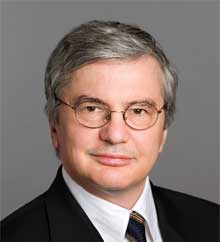Napoleone Ferrara


- Year of birth: 1956

- Wikipedia
BIOGRAPHY
Prof. Ferrara earned his M.D. from the University of Catania Medical School in 1981 and completed his postdoctoral research at the University of California, San Francisco.
In 1989, Napoleone Ferrara achieved a groundbreaking milestone by isolating and cloning vascular endothelial growth factor (VEGF), a discovery that established VEGF as a crucial regulator of both normal and pathological angiogenesis. Subsequent studies demonstrated that inhibiting VEGF suppresses the growth of various tumours in vivo, providing the first direct evidence that blocking angiogenesis can halt tumour progression. This pivotal finding led to the development of bevacizumab. Additionally, Ferrara's work revealed VEGF's role in intraocular neovascular syndromes, leading to the clinical development of ranibizumab, a humanized anti-VEGF Fab approved for treating neovascular age-related macular degeneration (AMD) and other ocular vascular disorders. Ferrara is currently a Distinguished Professor of Pathology and holds adjunct professorships in Ophthalmology and Pharmacology at the University of California, San Diego. His research focuses on the biology of angiogenesis and the identification of its regulators.
Awards and Honors: Recipient of numerous awards, including the Lasker Award, Breakthrough Prize in Life Sciences, AACR Pezcoller Award, and Gairdner International Award. Member of the National Academy of Sciences and the National Academy of Medicine.

